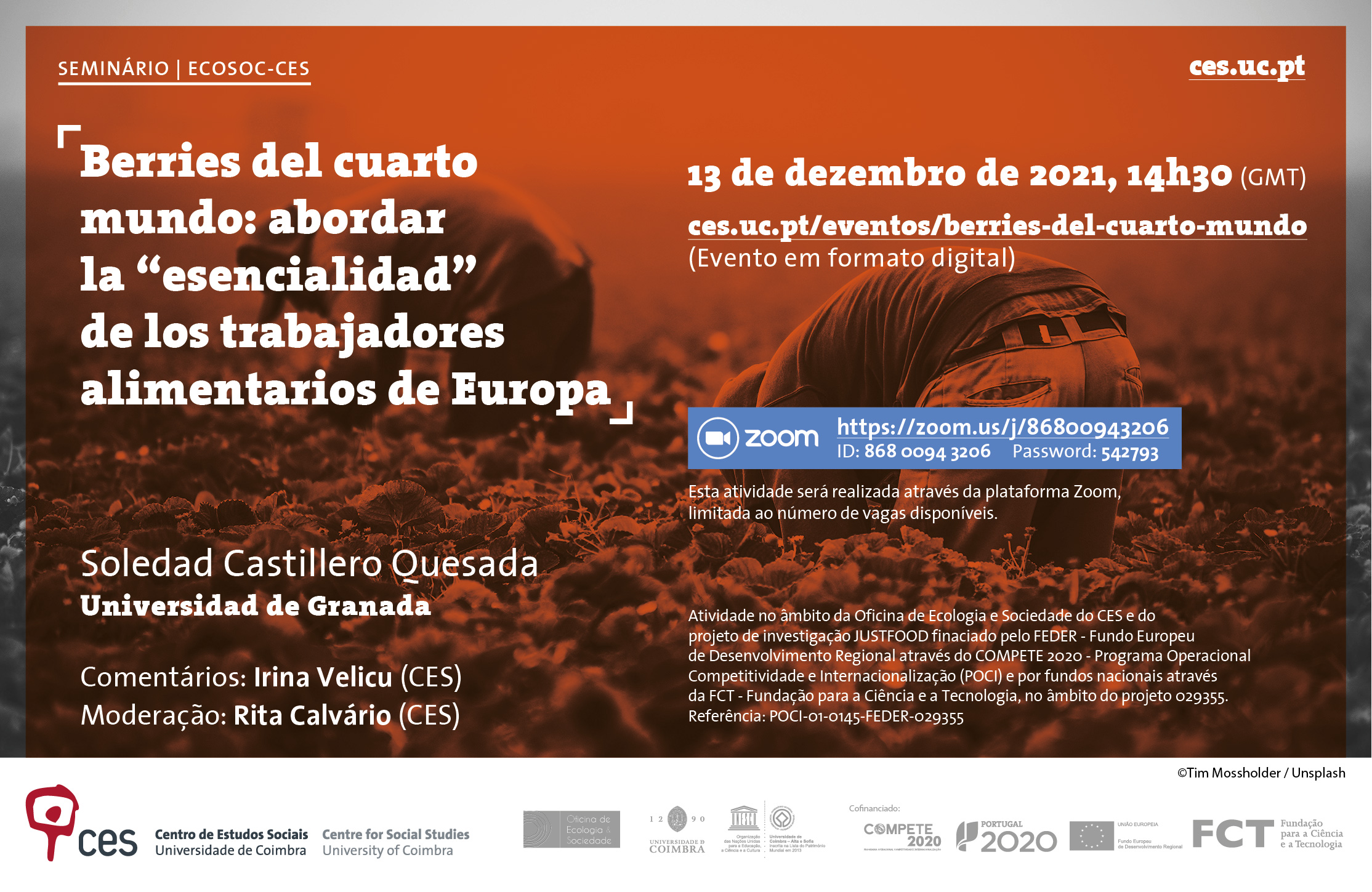Seminar | ECOSOC-CES
Fourth world berries: addressing the "essentiality" of Europe's food workers
Soledad Castillero Quesada (Universidad de Granada)
December 13, 2021, 14h30 (GMT)
Online event
Comments: Irina Velicu (CES) | Moderator: Rita Calvário (CES)
Overview
In this workshop we will address the socio-labour conditions of workers in the soft fruit production sector in the province of Huelva, Andalusia. This is the world's leading strawberry exporting region, which is why it is known as “red gold”. This crop is sustained by migrants from African countries, Eastern Europe, Northern Morocco and Central America. This consolidates a geopolitics that allows 11.464 hectares to be occupied to export fruit to the countries of the North, sustained by people from different latitudes of the Global South. A mass of workers who, to paraphrase Mbembé, come to inhabit a ‘fourth world’. By fourth world, we mean the population that, while belonging to the so-called “first world”, lives in a state of absolute precariousness because, without having been expelled from the welfare state, they occupy the margins of society. These are people that are indispensable in crop cultivation, but who are condemned to a state of continuous precariousness, given their working conditions. Several organised collectives have denounced the irregularities they face, such as the Colectivo de Jornaleras de Huelva en Lucha [Huelva Day Labourers' Collective in Struggle] and the Colectivo de Trabajadores Africanos [African Workers' Collective]. Both show, on the one hand, how poverty is feminised in the sector and how essential workers are allowed to live in shacks or substandard housing during a global pandemic. The workshop aims to use a qualitative ethnographic methodology to show, through the stories of the workers, the socio-labour costs that make such a large-scale production possible. That which we do not see when we consume, but which makes it possible.
Bio note
Soledad Castillero Quesada is a Social Anthropologist and holds a Master's degree in Development Cooperation and Public Management of NGDOs from the University of Granada. She is a researcher at the Institute of Migration in the Laboratory of Intercultural Studies at the University of Granada and at the Department of Social Anthropology through a pre-doctoral contract for University Teacher Training (FPU) from the Ministry of Education.
She is currently working on her doctoral thesis which analyses the socio-labour impacts of the globalised agri-food industry, based on a case study of the soft fruit production sector in the province of Huelva, Andalusia (Spain). Her lines of research revolve around gender, migration, anthropology of food and globalisation studies. As a result of the grants for short stays of the Ministry of Education of the Spanish Government, she is currently doing a research stay at CES under the supervision of Irina Velicu and Rita Calvario, where she is collaborating in the JUSTFOOD project.
Activity under the scope of the a CES Ecology and Society Lab and the research project JUSTFOOD funded by FEDER - European Regional Development Fund through COMPETE 2020 - Competitiveness and Internationalisation Operational Programme (POCI) and by national funds through FCT - Foundation for Science and Technology, within the scope of the project 029355. Referência: POCI-01-0145-FEDER-029355
_________________________
This activity will be accessible through the Zoom platform and will be limited to number of available places:
https://us02web.zoom.us/j/86800943206?pwd=NWh6eitQVHV0dkFwU25YSHlwcG9IZz09 | ID: 868 0094 3206 | Password: 542793
We appreciate that all participants keep the microphone muted until the moment(s) of debate. The host of the session reserves the right to expel the participant who does not respect the rules of the room.
Online open access activities such as this one do not grant a declaration of participation since such document will only be provided in events that provide for prior registration and controlled access.


